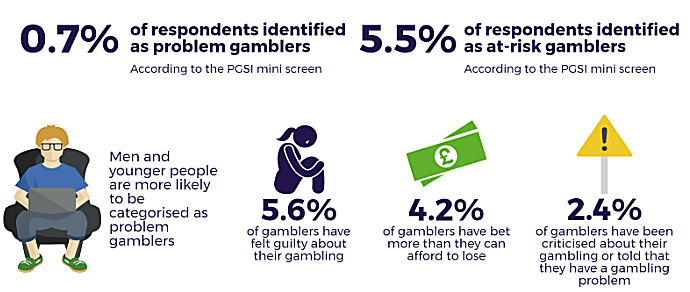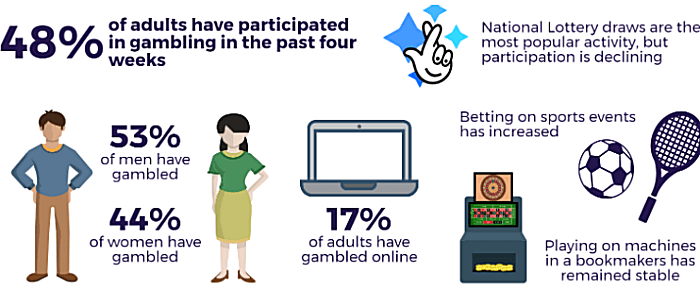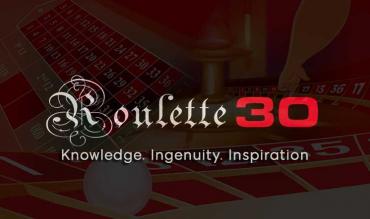The mind and psyche of the roulette player and gamblers in general, as well as the allure of gambling, are subjects very dear to my heart, and I try to approach them in various ways and from different angles. Gambling can be an extremely refreshing, rewarding, thought-provoking, exciting and intense experience. Unfortunately, though, it can also become a self-destructive obsession.
Gambling addiction, also known as compulsive gambling, is considered a type of impulse-control disorder. Like most other emotional conditions, it is understood to be the result of a combination of biological vulnerabilities, ways of thinking and social parameters. The worst way to ponder such serious issues is to pretend you know anything (or everything) about it. None can truly understand or feel exactly what the problematic gambler experiences. And not all compulsive gamblers are the same – every human being is unique. If you feel near the edge and need help with gambling problems, take a look at these very useful responsible gambling tips.
Types of gamblers
Gamblers can be roughly categorized as action gamblers and escape gamblers. Action gamblers are mostly male, began gambling early in life, are intelligent, competitive, domineering and prefer games that require skill, like poker. They have euphoric feelings similar to being high from cocaine. Escape gamblers, on the other hand, prefer games of pure luck, like slot machines or lotto. They gamble to escape other problems, and while playing they are free from any physical and emotional pain. There is also a subtype of gambling obsession, that is called “Binge gambling” which involves problematic gambling, but only during specific periods of time. What type of gambler are you? Take the personality test and find out.
For the majority of addictions, how much you spend is regulated by how much the body can endure. There is just so much heroin, cocaine or vodka you can use before you end up in a hospital or a mortuary. Betting is subject to no such constraints. Therefore the amount of financial ruin you can wreak is unlimited! Theoretically, you can bet $50,000 in a single hand, every minute. Gambling kills you because it doesn’t kill you. The executioner of compulsive gamblers is debt. Once negative equity enters the picture, gambling obsession rises into a class of its own. If you quit drinking, you can still go get a job. But once you’ve got a gambling debt twice your annual income, it’s hard to come back from that. And living without cash is a great deal harder than living without alcohol.
There was a story in the paper about a Vietnamese gambler who, having been hounded by loan bosses, dug a hole underneath his kitchen and covered up there for many weeks. There’s a great symbolism in this story. Compulsive gamblers feel an intense urge to vanish, to remove themselves from the world.
It’s in the brain
Dopamine, a chemical that regulates human behavior, including weighing relative rewards and anticipation of those rewards, flooded a part of gambling addicts’ mid-brains called the nucleus accumbens. The chemical rush created overstimulated feelings of interest and excitement for the addicts, a reaction that did not occur among non-addicts. The dopamine rush among addicted research subjects occurred before any gambling and in response to cues indicating that gambling was about to occur, such as an image of a slot machine or the person’s favorite casino.
If the substance created the addiction, then everyone would become an alcoholic. With gambling, triggers go off in compulsive gamblers brain differently than in other people minds. Scientist do not know why that happens. There could be a genetic component. But the determining factor is the person, not the game. Indeed, a research involving small groups of gamblers indicates that pathological gamblers have a chemical addiction to gambling, which produces in their brains the same kind of “hyperactive dopamine response” found in people who abuse hard drugs. It’s verified and quite striking: the gambling addicts have too many clinical similarities with the cocaine addicts.
A very rough and true self-documentary of the gambling life of Tony McDew, an ordinary guy who lives and gambles in the casinos of Las Vegas, Nevada.
Facts and Figures
- Over 10% of the population gamble in one form or the other at least once a week.
- 3% of the population has problems caused by gambling
- 1% are pathological gamblers and have serious problems.
- Women represent 25% of the problematic gamblers and their percentage is on the rise.
- Men tend to develop this addiction during their early teenage years while women tend to develop it later.
- The gambling obsession in women tends to get worse at a much faster rate than in men.
- Men tend to become addicted to more interpersonal forms of gaming, like blackjack, craps or poker, whereas women tend to engage less in interpersonal gambling, they like slot machines or bingo.
- Over 20 billion dollars is spent annually on gambling activities all over the world.
- Internet has made it a lot easier for women and teenagers to engage in some kind of gambling activity.
New findings as of 2017 from GambleAware:
- Remote gambling accounts for about 40% of the £15bn-a-year UK industry
- Problem gamblers place up to 90 bets a day
- Problem gamblers more likely to gamble in the middle of the night
- People with online gambling problems spend an average of £98 a day compared with £14 among those not at risk
- Young, unmarried men who are unemployed but looking for work are considered most at risk of developing a problem
If you need even more problem gambler’s behavior stats, especially for the UK, look no further than the Gambling Commission, which has done amazing research on the subject.


Diagnostic Criteria for Pathological Gambling
Problematic behavior is indicated by 5 (or more) of the following:
- Preoccupied with gambling. Thinking past gambling experiences, handicapping or planning the next venture, or thinking of ways to get money with which to gamble.
- Need to gamble with increasing amounts of money in order to achieve the desired excitement.
- Repeated unsuccessful efforts to control, cut back, or stop gambling. Being restless or irritable when attempting to cut down or stop gambling.
- Escape. Gambling to improve mood or escape problems.
- Chasing. Trying to win back gambling losses with more gambling.
- Lies to family members, therapist, or others to conceal the extent of involvement with gambling.
- Committing illegal acts such as forgery, fraud, theft, or embezzlement to finance gambling.
- Jeopardized or lost a significant relationship, job, or educational or career opportunity because of gambling.
- Relying on others to provide money to relieve a desperate financial situation caused by gambling.
However, some theoretical “symptoms” of compulsive gambling are pure nonsense, or to put it another way, they are pure human nature.
Escape. Gambling to improve mood or escape problems.
It’s only natural to gamble to improve mood or escape problems. Why else would you gamble anyway? We go to a restaurant, see a movie, play or watch football, try to make sex… If you think about it most things we do in our free time is to improve mood or escape problems.
Chasing. The subject tries to win back gambling losses with more gambling.
In my opinion a better list of indicators that gambling is out of control is this:
- It’s affecting your relationships, your finances or your work life
- You’re devoting more and more time and energy to gambling pursuits
- You’ve unsuccessfully tried to stop or cut back on your gambling
- You resort to theft or fraud to get gambling money
- You ask others to bail you out of financial woes because you’ve gambled money away
The 5 Most Expensive Addictions
|
Addiction Type
|
Annual Spending
|
| Alcohol | $166 Billion |
| Smoking | $157 Billion |
| Drugs | $110 Billion |
| Overeating | $107 Billion |
| Gambling | $40 Billion |
| Addiction Rehab | $18 Billion |
Help
It is not easy task to deal with gambling addiction. Treatment for problem gambling involves counseling, cognitive behavioral therapy (CBT), step-based programs, self-help, peer-support, medication, motivational interviewing or a combination of these. However, no one treatment is considered to be most efficacious and no medications have been approved for the treatment of pathological gambling by the US Food and Drug Administration (FDA). Theoretically the best source of help is probably Gamblers Anonymous. Gamblers Anonymous use a 12-step program adapted from Alcoholics Anonymous which places an emphasis on peer support.
